Cooking is an essential part of our daily lives, but did you know that the utensils you use in the kitchen could impact your health?
Traditional cooking utensils such as non-stick pans, aluminium pots and pans, and plastic spatulas contain toxic chemicals that can leach into your food. This is where non-toxic cooking utensils come in.
Non-toxic cooking utensils are kitchen tools made from materials that are safe for food preparation and do not contain harmful chemicals.
These utensils are an alternative to traditional cooking tools that contain toxic elements such as PFOA and PFAS.
Alternatively, non-toxic cooking utensils are mostly made from natural materials such as bamboo, wood, stainless steel, and silicone.
The use of non-toxic cooking utensils is important for a number of reasons:
- Firstly, they prevent toxic chemicals from leaching into your food and potentially harming your health.
- Secondly, non-toxic cooking utensils are more durable and have a longer lifespan than traditional ones.
These features show that you won’t have to replace them as often, which is more cost-effective and environmentally friendly.
Related: Do you know how many harmful materials are in your kitchen?
Let’s have a look at the different types of non-toxic cooking utensils.
Non-Toxic Wooden Cooking Utensils
Wooden cooking utensils have been used for centuries for their natural, non-toxic properties.
They offer a variety of advantages over other materials, making them a popular choice for many home cooks. However, there are also some disadvantages to consider before switching to non-toxic wooden cooking utensils.
Benefits
- Non-toxic: Wooden utensils are made from natural materials, making them a safe and healthy alternative to other materials.
- Durable: If properly cared for, non-toxic wooden utensils can last for years without cracking, splitting or becoming contaminated with bacteria.
- Non-reactive: Unlike metal and other materials, non-toxic wooden utensils do not react with acidic foods, making them ideal for cooking tomato-based sauces, marinades, and other acidic dishes.
- Eco-friendly: Wooden utensils are a renewable, biodegradable and sustainable resource, making them an environmentally-friendly choice.
- Versatile: Non-toxic wooden utensils can be used for a variety of cooking tasks, from stirring to serving.
Drawbacks
- Require care: Unlike other materials, non-toxic wooden utensils require regular care to maintain their longevity. So, the user may have to wash, oil, and dry them after each use.
- Can crack or split: If exposed to excessive heat or moisture, wooden utensils can crack or split, making them less durable over time.
- Prone to bacteria: If not properly cleaned and sanitized, non-toxic wooden utensils can become contaminated with bacteria.
- Not dishwasher safe: Unlike other materials, wooden utensils cannot be cleaned in the dishwasher, which may be inconvenient for some users.
How To Choose The Best Non-toxic Wooden Cooking Utensils?
When choosing non-toxic wooden cooking utensils, it is important to look for utensils made from high-quality wood that are free of harmful chemicals.
It is also a good idea to look for utensils that are well-crafted and have smooth surfaces that are easy to clean. In addition, look for utensils that are comfortable to hold and have a good balance for easy use.
Here are some additional factors for your consideration when choosing a non-toxic kitchen appliance:
- Material: Ensure the utensils are made from high-quality, sustainable wood, such as bamboo or beech.
- Size: Choose utensils that are the right size for your cooking needs, from large spoons and spatulas to smaller tongs and forks.
- Comfort: Look for utensils that have comfortable handles and are easy to grip, especially if you have arthritis or other joint conditions.
- Purpose: Consider the specific tasks you’ll be using the utensils for and choose those that are best suited to your needs.
Caring For Non-Toxic Wooden Cooking Utensils
To ensure that your non-toxic wooden cooking utensils last for many years, it is important to take good care of them.
- After each use, rinse the utensils with warm water and let them air dry completely.
- Store the utensils in a dry place, away from direct sunlight and heat, to prevent warping or splitting.
- To keep the utensils looking their best, occasionally apply a light coat of mineral oil to keep them hydrated.
Can You Use Non-Toxic Wooden Utensils On Nonstick Pans?
Yes, you can use non-toxic wooden utensils on nonstick pans.
However, it is crucial to be mindful of the type of non-toxic wooden utensils you use and the condition of the nonstick surface.
Some wooden utensils may have rough or splintered edges that can scratch or damage the nonstick coating, so it’s best to use wooden utensils that are well-made and smooth.
In general, using wooden utensils made from bamboo or silicone-coated wooden utensils is considered safe for use on nonstick pans.
It is also important to avoid using sharp utensils, such as knives or metal spatulas, on nonstick surfaces, as these can scratch or damage the coating and release toxic fumes when cooking.
Best Non-Toxic Wooden Cooking Utensils
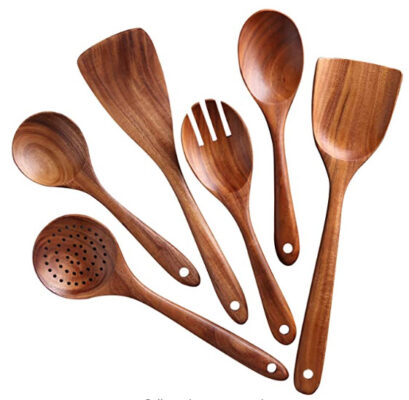
NAYAHOSE Wooden Spoons
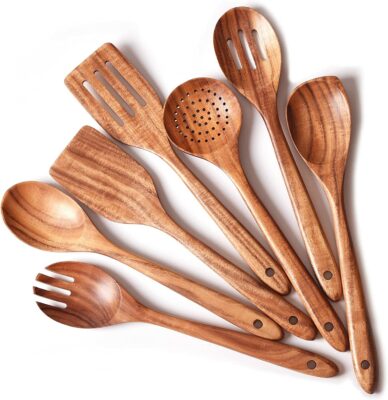
Gudamaye 13 inch Long Wooden Utensils
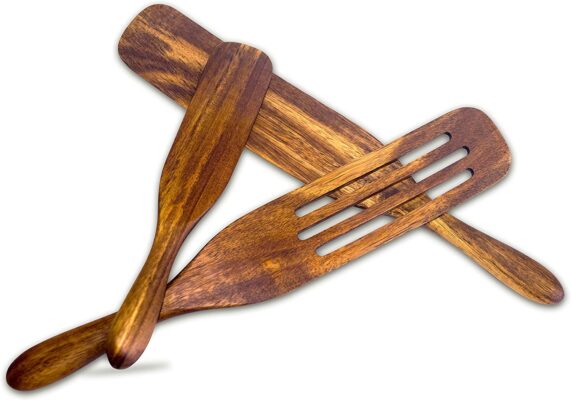
Lamplight Kitchen Acacia Wood Spurtle 3-Piece Set
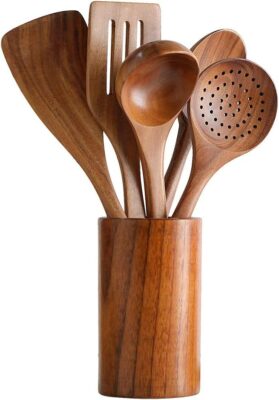
Tmkit Wooden Cooking Tools and storage wooden barrel
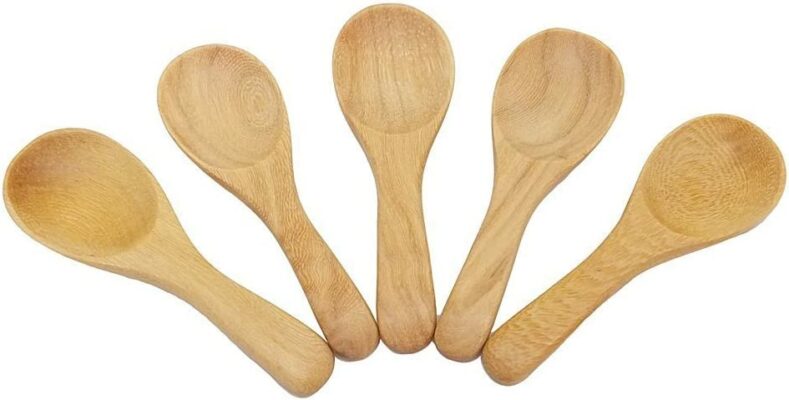
Vikrom Tembusu Wood Small Spoons
Non-Toxic Stainless Steel Cooking Utensils
Stainless steel is a popular material for cooking utensils due to its durability and resistance to rust and staining. It is also a non-reactive material, making it ideal for cooking acidic foods such as tomatoes or lemon juice.
So, what’s the difference between stainless steel and non-toxic stainless steel cooking utensils and is stainless steel non-toxic?
Stainless steel and non-toxic stainless steel cooking utensils are similar in that they are both made of stainless steel, a type of metal resistant to rust and staining. The main difference between the two is the level of toxic elements they contain.
Stainless steel is an alloy that typically contains iron, chromium, and nickel. While it is considered a safe material for cooking, some types of stainless steel can contain trace amounts of toxic elements such as lead or cadmium, which can leach into food and potentially harm your health.
So, is stainless steel non-toxic? We’ll have to say not completely, which may vary from material to material.
On the other hand, non-toxic stainless steel cooking utensils are specifically designed to be free of toxic elements such as lead and cadmium. These utensils are often made from high-quality stainless steel that has been tested and certified to meet safety standards, and they are considered a safer option for cooking.
These types of non-toxic stainless steel cooking utensils come in a wide range of shapes and sizes, making them ideal for cooking up a variety of dishes, from stir-frying vegetables to searing steaks.
Here are some pros and cons of non-toxic stainless steel cooking utensils:
Benefits
- Durable and long-lasting: Stainless steel is a strong and sturdy material that can withstand high temperatures and frequent use.
- Non-reactive: Stainless steel is non-reactive, making it safe to cook acidic foods.
- Easy to clean: Stainless steel is dishwasher safe and easy to clean by hand.
- Resistant to rust and staining: Stainless steel does not rust or stain, keeping your utensils looking new for a long time.
Drawbacks
- Prone to scratching: Stainless steel can scratch easily, especially when used with metal utensils.
- Can be heavy: Some stainless steel utensils can be heavy, making them difficult to handle for some users.
- Expensive: Stainless steel utensils can be more expensive than other materials such as plastic or wood.
How to Choose the Best Non-Toxic Stainless Steel Cooking Utensils?
Non-toxic stainless steel cooking utensils are a great choice for a number of reasons.
They are also easy to clean and won’t rust or corrode like other materials. But how do you know which ones are right for you?
There are a number of factors to consider when choosing your non-toxic stainless steel cooking utensils, including:
- Material: Make sure to choose high-quality stainless steel that is non-reactive, so it won’t affect the taste of your food.
- Heat resistance: Look for cooking utensils with heat-resistant handles so you can use them on the stove without worrying about burning your hands.
- Versatility: Consider the different shapes and sizes available to determine which ones are most useful for your cooking style.
- Price: Determine your budget and look for utensils that provide good value for your money.
Related: Best Non-Toxic Waffle Makers for a Healthy Breakfast
Caring for Non-Toxic Stainless Steel Cooking Utensils
Here are some tips to keep your stainless steel kitchen utensils looking great:
- Wash by hand: Avoid using a dishwasher, as it can cause staining and damage to the utensils. Instead, wash by hand with warm soapy water.
- Dry thoroughly: Make sure to dry the utensils to prevent water spots and rust thoroughly.
- Store properly: Store the utensils in a dry place to prevent rust from forming.
- Avoid harsh chemicals: Avoid harsh chemicals like bleach or steel wool on the utensils, as they can cause damage.
By considering these factors and following these tips, you can ensure that your non-toxic stainless Steel cooking utensils are of high quality and provide you with years of reliable use.
Whether you are a seasoned cook or just starting, investing in high-quality non-toxic stainless steel cooking utensils is a great way to enhance your cooking experience and make your time in the kitchen more enjoyable.
Best Non-Toxic Stainless Steel Cooking Utensils
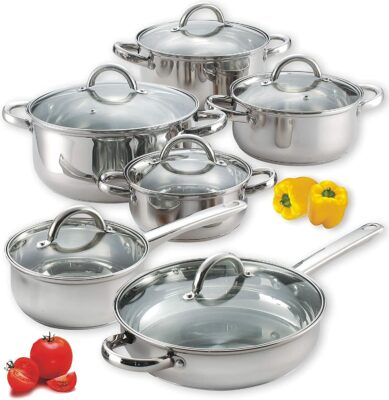
Cook N Home 12-Piece Stainless Steel Cookware Set
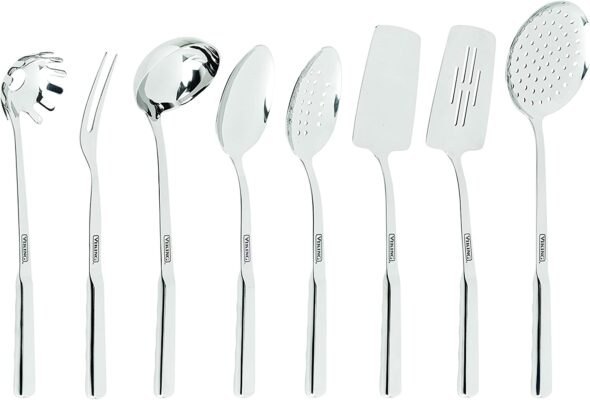
Viking Culinary 8pc Stainless Steel Ergonomic Kitchen Utensil
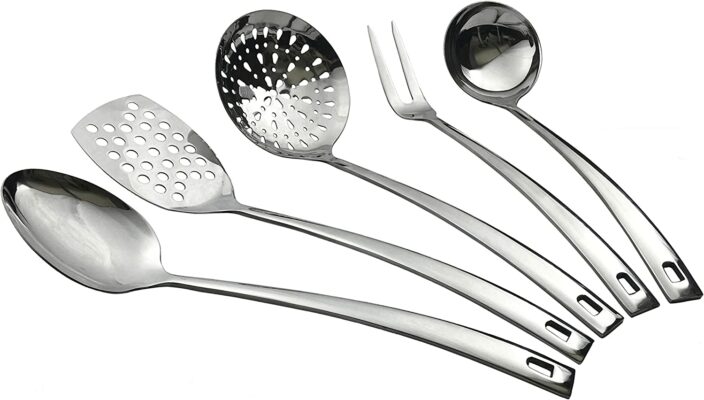
Unique Effects Home Kitchen Utensils
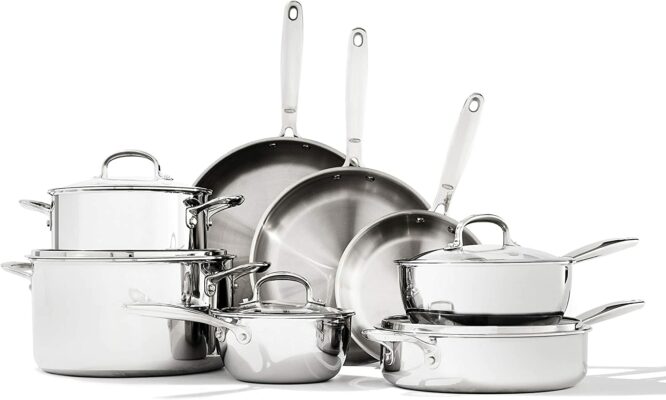
OXO Good Grips Pro Tri Ply Stainless Steel Cookware Pots and Pans
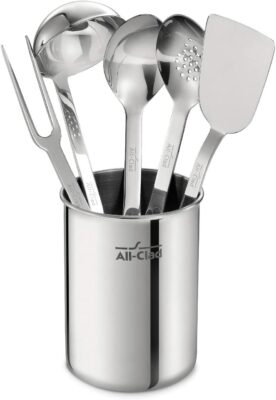
All-Clad Professional Stainless Steel Kitchen Tool
Non-Toxic Silicone Cooking Utensils
Food-grade silicone is a synthetic material that is non-toxic, non-reactive, and safe to use with food. The material provides many advantages over other types of cooking utensils, including its non-stick properties and durability.
Here are the pros and cons of using non-toxic silicone cooking utensils:
Benefits
- Non-toxic: Silicone is a synthetic material that does not contain harmful chemicals or substances, making it safe for food preparation.
- Heat resistant: Silicone can withstand high temperatures, making it safe for use in the oven, microwave, and stovetop.
- Non-stick: Silicone is non-stick, making it easy to clean and reducing the amount of oil and grease needed in cooking.
- Lightweight and flexible: Silicone utensils are lightweight and flexible, making them easy to handle and maneuver.
- Durable: Silicone is a durable material that can withstand wear and tear, making it a long-lasting investment.
Drawbacks
- Poor heat conductivity: Although silicone can withstand high temperatures, it does not conduct heat well, making it difficult to judge when food is cooked.
- Prone to staining: Silicone is susceptible to staining, especially if used with acidic foods such as tomatoes.
- Difficulty in controlling heat: Silicone utensils may not distribute heat evenly, making it difficult to control the cooking process.
How To Choose The Best Non-Toxic Silicone Cooking Utensils?
Here are the considerations you should keep when selecting the best non-toxic silicone cooking utensil for your kitchen:
Look for high-quality silicone: High-quality silicone is more durable and less prone to staining and warping.
Check for certifications: Look for silicone utensils that have been certified by recognized organizations for safety and quality.
Consider the size and shape: Choose silicone utensils that are comfortable to handle and fit your cooking needs.
Look for a non-slip grip: Silicone utensils with a non-slip grip provide better control and safety during use.
Caring For Non-Toxic Silicone Cooking Utensils
To care for your non-toxic silicone cooking utensils, do the following:
Wash with soap and water: Clean silicone utensils with soap and water after each use to prevent staining and bacteria buildup.
Avoid abrasive materials: Do not use abrasive materials or harsh chemicals to clean silicone utensils, as this may cause damage.
Store in a dry place: Store silicone utensils in a dry place to prevent bacteria growth.
Silicone Vs. Stainless Steel Utensils
Both silicone and stainless steel have their own advantages and disadvantages when it comes to cooking utensils. The best option will depend on your specific needs and preferences.
Silicone may be the best choice if you are looking for a non-toxic and heat-resistant option.
If durability and heat conductivity are more important, stainless steel may be the better option.
However, be sure to choose high-quality stainless steel that has been tested and certified to be free of toxic elements.
Best Non-Toxic Silicone Cooking Utensils
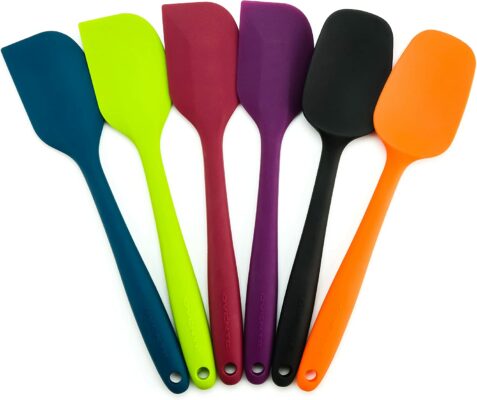
Ovente 6 Pieces Non-Stick Silicone Spatula Set
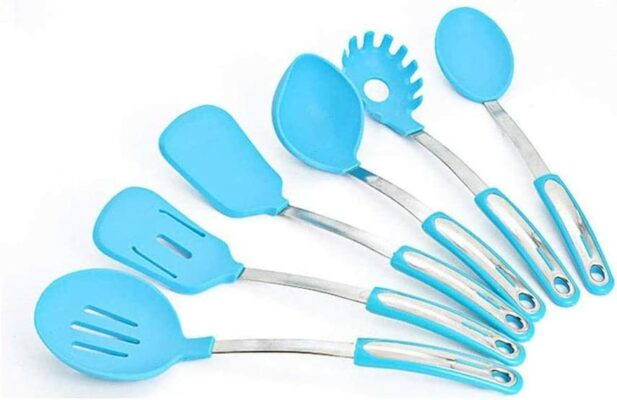
WSSBK Silicone Cooking Tool
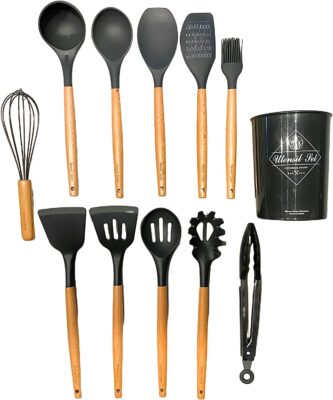
Nexxt Door 12-Pcs Silicone Cooking Utensils Set
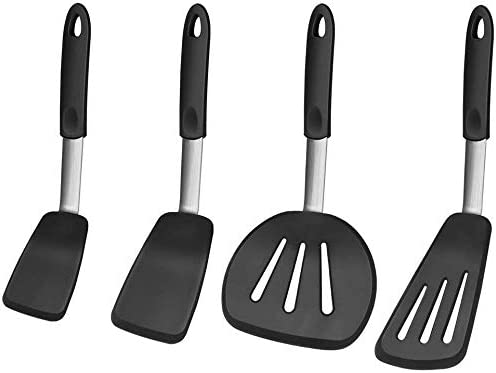
V shine Silicone Flexible Spatula pack

WSSBK Non-Toxic Silicone Cooking Tools
Non-Toxic Glass & Ceramic Cooking Utensils
Non-Toxic Glass and Ceramic Cooking Utensils are a popular alternative to traditional metal or plastic utensils in the kitchen. Both glass and ceramic have unique properties that make them excellent cooking, baking, and serving choices.
Here are the pros and cons of using non-toxic glass & ceramic cooking utensils:
Benefits
- Non-Toxic: Both glass and ceramic are non-toxic and do not contain any chemicals that can leach into food, making them a safe option for cooking.
- Durable: Glass and ceramic are both known for their durability and are less likely to chip or scratch than other materials like plastic.
- Even heating: Non-toxic glass and ceramic cookware provide an even heat distribution, reducing the likelihood of hot spots or burned food.
- Oven, microwave, and dishwasher safe: Both non-toxic glass and ceramic cooking utensils are safe to use in the oven and microwave and can be easily cleaned in the dishwasher, making them convenient for everyday use.
Drawbacks
- Fragile: Glass and ceramic are more fragile than other materials and are more susceptible to breaking if dropped or bumped.
- Expensive: Non-toxic glass and ceramic cookware can be more expensive than other options like stainless steel or plastic.
- Heat retention: Glass and ceramic can retain heat longer than other materials, which can be a disadvantage if you prefer to cook with lower heat.
How to Choose the Best Glass & Ceramic Cooking Utensils
- Look for high-quality materials: When choosing non-toxic glass and ceramic cooking utensils, look for those made from high-quality materials that are free of harmful chemicals.
- Consider the type of cooking you’ll be doing: Choose utensils that are appropriate for the type of cooking you’ll be doing, taking into account their fragility and heat resistance.
- Look for a good weight balance: Look for non-toxic glass and ceramic cooking utensils that have a good weight balance and are comfortable to use.
- Design: Choose utensils with ergonomic handles that are comfortable to grip and provide a secure hold.
- Size: Select utensils that are appropriately sized for the dishes you’ll be cooking.
- Set: Consider purchasing a set of non-toxic glass or ceramic utensils for a complete kitchen collection.
Related: Best Ceramic Waffle Makers | Are Ceramic Waffle Makers More Durable?
Caring for Non-toxic Glass & Ceramic Cooking Utensils
- Hand wash: It is best to wash non-toxic glass and ceramic utensils by hand to avoid scratches or chips.
- Avoid abrasive sponges: Use a soft sponge or cloth to wash glass and ceramic utensils, and avoid abrasive sponges that can scratch the surface.
- Store carefully: Store non-toxic glass and ceramic utensils in a safe place to prevent breakage.
Best Non-Toxic Glass and Ceramic Cooking Utensils
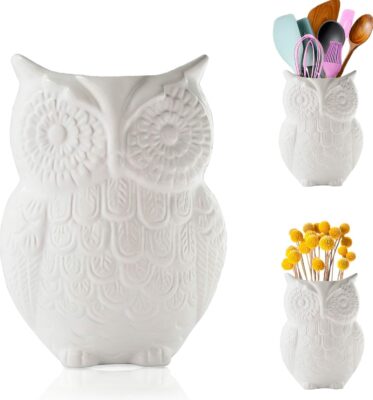
Comfify Owl Utensil Holder Decorative Ceramic Cookware Crock
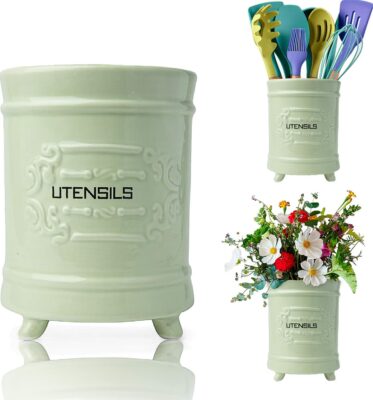
French Green Ceramic Utensil Holder
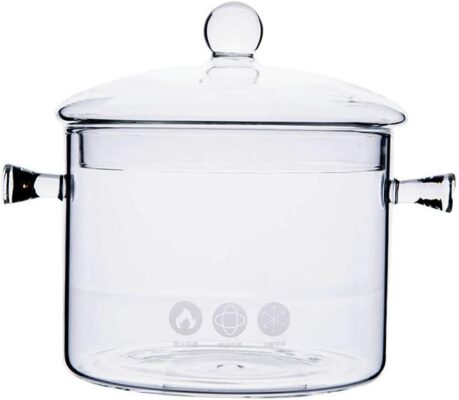
KINO Glass Clear Pasta Instant Noodle Pot
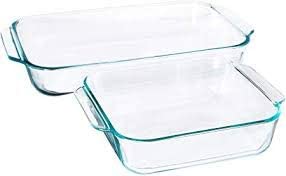
Pyrex Basics Clear Glass Baking Dishes
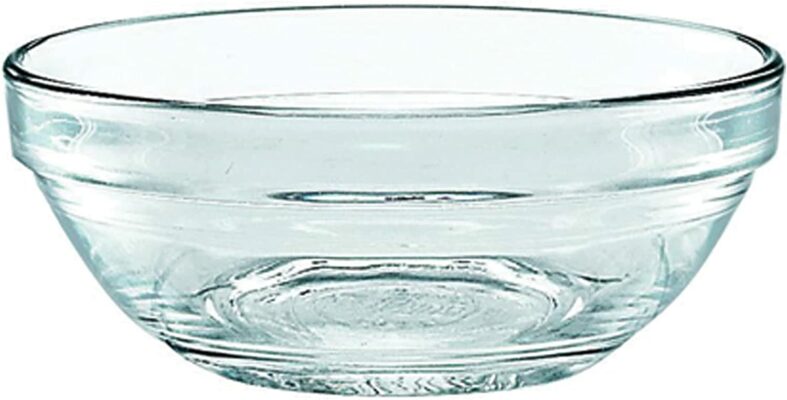
Duralex Stacking Bowl
Toxic Cookware Materials to Avoid
Cookware is essential in every kitchen and is used daily to cook and prepare food. However, not all cookware is safe, and some materials contain toxic chemicals that can leach into food and risk our health.
When it comes to cooking, the type of cooking utensils you use is just as important as the ingredients you cook with.
While many cookware materials can be safe and convenient, some contain harmful chemicals that can leach into your food and potentially harm your health.
To make sure you’re cooking with safe and non-toxic cooking utensils, it’s important to avoid cookware made with these toxic materials:
The following are the toxic cookware materials to avoid:
1. BPA Plastic
Bisphenol A (BPA) is a type of chemical used to manufacture plastic products, including some plastic cookware. BPA is known to disrupt hormones and has been linked to several health problems, such as infertility, heart disease, and cancer. Choose cookware made of glass, stainless steel, or ceramic to avoid exposure to BPA.
2. Polytetrafluoroethylene (PTFE)
PTFE is a synthetic fluoropolymer used to make non-stick cooking utensils. When exposed to high heat, PTFE releases toxic fumes that can be harmful if inhaled. To avoid this, choose cookware made of cast iron, stainless steel, or ceramic.
3. Nickel
Some stainless steel cookware contains nickel, a metal that can cause skin irritation and trigger allergic reactions in some people. To avoid exposure to nickel, look for non-toxic stainless steel cooking utensils that are nickel-free or choose cookware made of cast iron or ceramic.
4. Phthalates
Phthalates are a group of harmful chemicals used to make plastic flexible and are commonly found in plastic food containers and cooking utensils. Phthalates have been linked to reproductive and developmental problems, as well as cancer. To avoid exposure to phthalates, choose non-toxic cooking utensils made of glass, stainless steel, or ceramic.
5. Nylon
Nylon is a synthetic polymer used to make cooking utensils, such as spatulas and spoons. When exposed to high heat, nylon releases toxic fumes that can be harmful if inhaled. To avoid exposure to nylon, pick non-toxic cooking utensils made of natural materials, such as wood or silicone.
So, it is important to be aware of cookware’s toxic materials and choose safer options. By avoiding BPA plastic, PTFE, nickel, phthalates, and nylon, you can protect your health and ensure your food is safe.
Healthiest Cooking Utensils: What Are They Made From?
The healthiest cooking utensils are those made from natural, non-toxic materials that do not leach harmful chemicals into food. Some of the best options include stainless steel, wood, glass, and ceramic. These materials are durable, safe, and do not react with food.
The dangers of using traditional cooking utensils made from materials such as Teflon and Aluminum
Traditional cooking utensils such as Teflon and Aluminum have been found to contain harmful chemicals that can leach into food when exposed to high heat.
Teflon has been found to contain perfluorooctanoic acid (PFOA), which is a carcinogenic substance. On the other hand, aluminium has been linked to different health problems.
Best Non-Toxic Kitchen Utensils
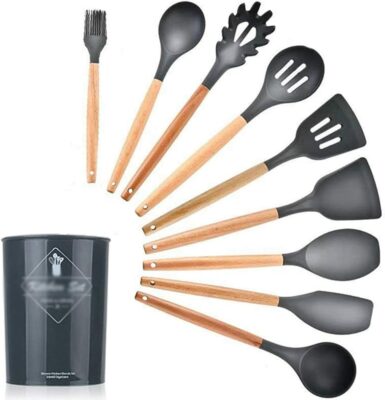
CUJUX 9 pcs Silicone Kitchen Utensil Set

Lamplight Kitchen Acacia Wood Spurtle 3-Piece Set

Unique Effects Home Kitchen Utensils

All-Clad Professional Stainless Steel Kitchen Tool

Pyrex Basics Clear Glass Baking Dishes
Non-Toxic Food Storage Solutions
Using non-toxic food storage solutions is a smart choice for protecting both our health and the environment. These solutions are made from materials that are free from harmful chemicals and help to keep our food safe and fresh for longer.
Here are some of the pros and cons of non-toxic food storage solutions:
Benefits
- Healthier food: Non-toxic food storage solutions prevent the leaching of harmful chemicals into the food, ensuring that it stays healthy and safe to eat.
- Increased food freshness: Non-toxic food storage solutions are designed to preserve the freshness of food, reducing the amount of spoilage and waste.
- Environmentally friendly: The non-toxic food storage solutions are often made from recyclable or biodegradable materials, making them an eco-friendly choice for storing food.
Drawbacks
- Higher cost: Non-toxic food storage options may be more expensive than traditional food storage solutions.
- Limited availability: Non-toxic food storage solutions may not be widely available in all areas, making it difficult to find the right product for your needs.
How to Choose the Best Non-Toxic Food Storage Solutions
Here are the factors you should keep in mind when selecting the best non-toxic food storage solutions for your kitchen:
- Material: Look for food storage solutions made from materials like glass, stainless steel, or silicone, which are known to be non-toxic and safe for food storage.
- Durability: Choose food storage solutions that are durable and long-lasting to reduce the need for frequent replacements.
- Airtight seals: Airtight seals are essential for keeping food fresh and preventing contamination. Look for food storage solutions with secure lids or snap-on covers.
Caring for Non-toxic Food Storage Solutions
- Clean regularly: Regular cleaning is essential to maintain the hygiene and quality of your food storage solutions. Wash them with warm soapy water and dry them thoroughly after each use.
- Store correctly: Store your non-toxic food storage solutions in a cool, dry place to prevent damage and prolong their lifespan.
Best Non-Toxic Food Storage Solutions
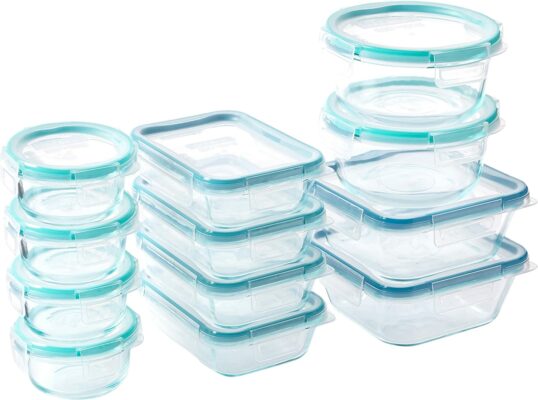
Snapware Total Solution Glass Food Storage Container
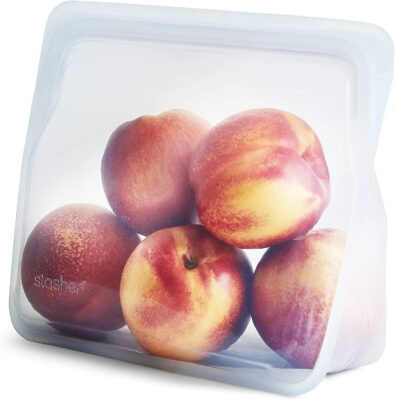
Stasher Silicone Reusable Container
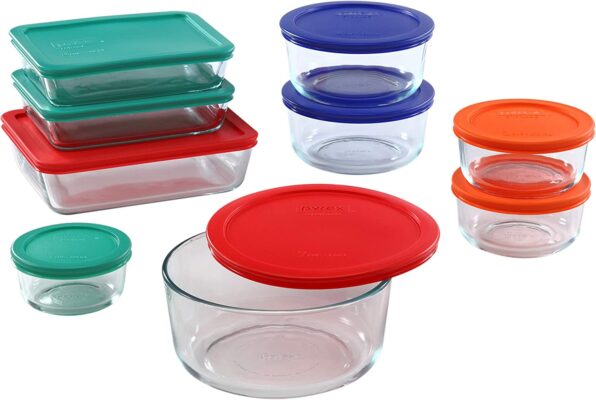
Pyrex Simply Store 18-Pc Glass Food Storage Containers
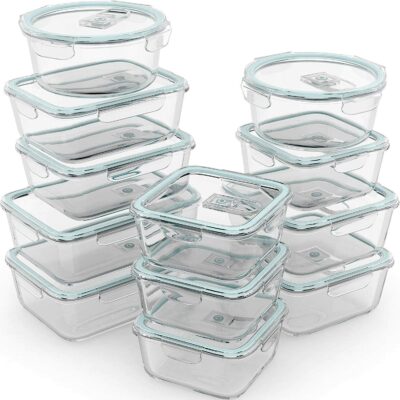
Razab 24 Pc Glass Food Storage Containers
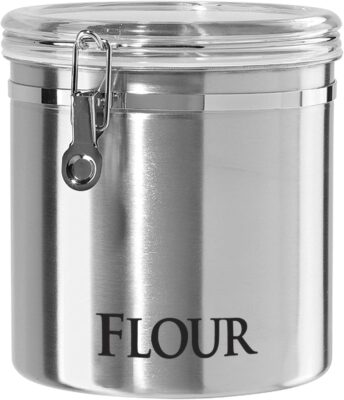
OGGI Jumbo Stainless Steel Flour Clamp Canister
Best Non-Toxic Cookware Set
Choosing non-toxic cookware is important for our health and the environment, as traditional cookware options can contain harmful chemicals. Here is a comprehensive list of the best non-toxic cookware sets available in the market:
1. MSMK Induction Cookware Set
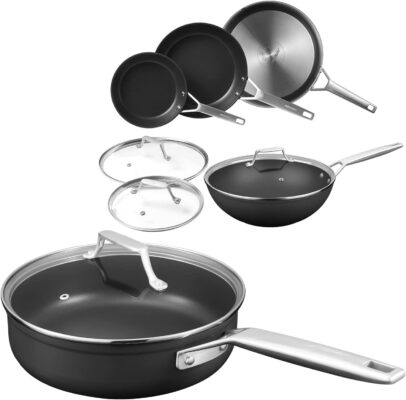
The MSMK 7 Piece Induction Cookware Set is a set of kitchen cookware designed for use with induction cooktops.
This cookware set typically includes a variety of pots and pans with different sizes and shapes to suit a variety of cooking needs. It’s usually made from materials like stainless steel, which is compatible with induction cooktops and are known for their durability and ease of cleaning.
2. Bloomhouse Stainless Steel Cookware Set
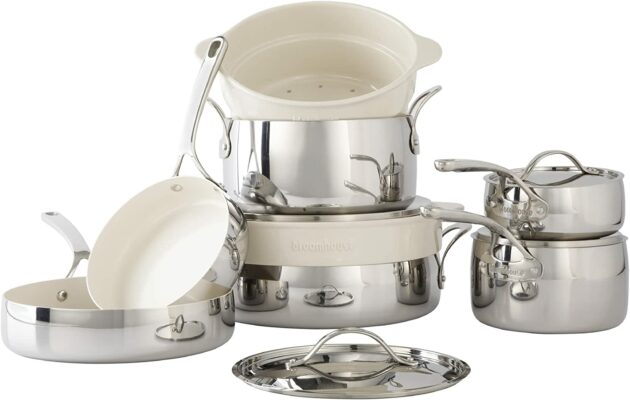
Bloomhouse Stainless Steel Cookware Set is a set of kitchen cookware made from stainless steel. Stainless steel is a popular material for cookware because it is durable, non-toxic (won’t corrode or discolor), and easy to clean.
It is also compatible with a variety of cooking surfaces, including gas, electric, and ceramic cooktops.
3. Caraway Nonstick Ceramic Cookware Set
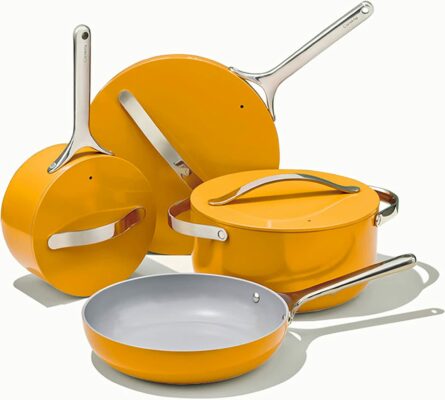
Caraway Nonstick Ceramic Cookware Set is a set of kitchen cookware with a nonstick ceramic coating.
Caraway Nonstick cookware is designed to reduce or eliminate the need for oil or butter in cooking, making it a popular choice for those looking to reduce fat in their diet or for those who simply want to avoid food sticking to the pan.
Conclusion
Non-toxic cooking products are made of materials that are naturally safe and non-toxic.
The non-toxic materials provide a safe and healthy alternative to traditional cooking products, and they are also durable and long-lasting, reducing the need for frequent replacement and the environmental impact of production and disposal.
Making the switch to non-toxic cooking products can seem overwhelming, but it is a small step that can greatly impact your health and the environment. Start by replacing your most-used cooking products, such as your frying pans and pots, with non-toxic options.
As you replace your cookware, consider investing in a complete cookware set, as this can be more cost-effective in the long run.
